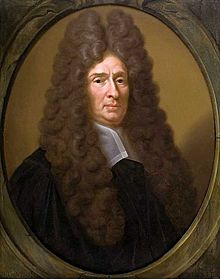Philipp Reinhard Vitriarius
Philipp Reinhard Vitriarius (born February 17, 1647 in Oppenheim , † July 30, 1720 in Leiden ) was a German legal scholar.
Life
Nothing is known about Philipp Reinhard Vitriarius' first career. It is possible that he is related to the Oppenheim pastor Johannes Vitriarius. On July 16, 1664, he enrolled at the University of Strasbourg , was here on December 2, 1672 a candidate for law and completed a law degree under Johann Heinrich Böckler (1611–1672). He received his legal exam on December 11, 1672, appeared on February 22, 1673 with the treatise Theses de Jure antecessoris in successorem , and in April 1673 became a private lecturer at the Strasbourg University.
In 1675 he took over a chair for international law at the Geneva Academy , where he had received the citizenship of the city. On September 25, 1682 he became professor of German constitutional law as the successor to Johannes Friedrich Böckelmann at the University of Leiden . Here he also took part in the organizational tasks of the university and was rector of the alma mater in 1693/94, 1702/03, and 1713/14 . For health reasons he resigned his professorship on October 21, 1719, which his son, Johann Jacob Vitriarius, took over from his marriage to Renee Dupuy (* 1656) .
Vitriarius drew a large number of students from the German Empire to the University of Leiden. Especially people from the Austrian parts of the country. His most important main work is the Justinianische Institutionennachschlagewerk Institutiones iuris publici , which was first published in Speier in 1683 and in 1686 under the name of Nicolaus Danckwerths. This work was based on the same institutional scheme by Johann Rhetz . It was founded by Johann Friedrich Pfeffinger expanded (1667-1730) to a four-volume work material and made deducible by registers. It then appeared under the title illustratus seu institutiones juris publici in Freiburg in 1691 and finally as Corpus iuris publici (4th vol.) Gotha 1712–1730. In addition, many other people had published the work. Including Jakob Carl Spener . Although the work was important for some contemporary witnesses, it was replaced by other reference works of a more scientific order soon after his death.
Works
- Commentatio de adminiculis juris publici Romano-Germanici, Leipzig 1740 in 4. cui accedit Notitia Subsidiorum juris Publici maxime Litteraria. author Henrico Gottlieb Francke.
- Institutiones Juris publici, T. IV. Gotha 1731 in 4. cum notis Joh. Fridr. Pfeffingeri.
- Institutiones juris naturae et gentium ad Methodum Hug. Grotii. Leiden 1704 ( online ), Halle 1718, Nuremberg 1726, Leiden 1734
- Universum jus civile privatum, ad Methodum institutionum. Suffering 1697
- Diss. Inaug. de jure Antecessoris in Successorem. Strasbourg 1673.
- Diss. De Actionis Perpetuatione. Leiden 1696.
- De Praefectis. Suffering 1709.
literature
- Vitriarius, Philipp Reinhard. In: Johann Heinrich Zedler : Large complete universal lexicon of all sciences and arts . Volume 49, Leipzig 1746, column 113 f.
- Christian Gottlieb Jöcher : General Scholar Lexicon, Darinne the scholars of all classes, both male and female, who lived from the beginning of the world to the present day, and made themselves known to the learned world, After their birth, life, remarkable stories, Withdrawals and writings from the most credible scribes are described in alphabetical order. Verlag Johann Friedrich Gleditsch, Leipzig, 1751, Bd., Sp. 1654
- Johannes van Kuyk: VITRIARIUS (Philippus Reinhardus) . In: Petrus Johannes Blok , Philipp Christiaan Molhuysen (Ed.): Nieuw Nederlandsch Biografisch Woordenboek . Part 3. N. Israel, Amsterdam 1974, Sp. 1316–1317 (Dutch, knaw.nl / dbnl.org - first edition: AW Sijthoff, Leiden 1914, reprinted unchanged).
- Abraham Jacob van der Aa : Biographical Woordenboek der Nederlanden. Verlag JJ van Brederode, Haarlem, 1876, vol. 19, p. 260 ( online )
- Ferdinand Frensdorff : Vitriarius, Philipp Reinhard . In: Allgemeine Deutsche Biographie (ADB). Volume 40, Duncker & Humblot, Leipzig 1896, p. 82.
- Charles Borgeaud: Histoire de l'Université de Genève: L'Acadamie de Galvin, 1559-1798. Georg, Geneva, 1900, pp. 386-389, and others.
Individual evidence
- ↑ Student Gießen, 1639 Pastor Guntersblum, 1650–1657 Pastor Oppenheim, a great-grandson of the first Biedenkopfer Lutheran Pastor Gerlach Walther
- ^ Charles Le Fort: Le livre du Recteur: catalog des étudiants de l'Académie de Genève de 1559 à 1859. Jules Guillaume Fick, Geneva, 1860, p. 376 ( online )
- ^ CA Siegenbeek van Heukelom-Lamme: Album Scholasticum Academiae Lugduno-batave. Brill Archive, Leiden, 1941, p. 164
- ^ Norbert Emmerich: Swiss (immigrants) in Heidelberg, after the Thirty Years' War. Books on Demand GmbH, Norderstedt, 2009, ISBN 978-3-8391-1627-2 , p. 420 ( online reading sample )
| personal data | |
|---|---|
| SURNAME | Vitriarius, Philipp Reinhard |
| BRIEF DESCRIPTION | German legal scholar |
| DATE OF BIRTH | February 17, 1647 |
| PLACE OF BIRTH | Oppenheim |
| DATE OF DEATH | July 30, 1720 |
| Place of death | Suffer |
